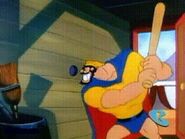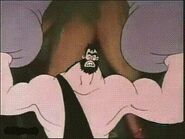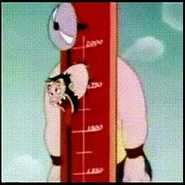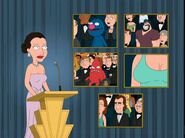Tag: sourceedit |
No edit summary Tag: rte-wysiwyg |
||
| Line 17: | Line 17: | ||
== Physical Evolution == |
== Physical Evolution == |
||
| + | |||
| − | [[File:Official how-to-draw-document.jpg|thumb|left|250px|The early 1940s Fleischer approach]]The Fleischer cartoon Bluto was based on the character named Red Flack (played by Tyrone Power Sr.) in the 1930 epic western film ''[https://www.youtube.com/watch?v=D8oEMfviBdk The Big Trail]'' ''. ''He was burly, mean, and strong as an ox--and only marginally more intelligent--and unquestionably a character to root ''against.'' |
+ | [[File:Official how-to-draw-document.jpg|thumb|left|250px|The early 1940s Fleischer approach]][[File:Bluto_Model_Sheet_1943.jpg|thumb|left|250px|A year later Famous Studios opted for a more muscular image]]The Fleischer cartoon Bluto was based on the character named Red Flack (played by Tyrone Power Sr.) in the 1930 epic western film ''[https://www.youtube.com/watch?v=D8oEMfviBdk The Big Trail]'' ''. ''He was burly, mean, and strong as an ox--and only marginally more intelligent--and unquestionably a character to root ''against.'' |
Following the takeover of the Popeye animated franchise by [[Paramount Studios]] in 1942, the Bluto character received a major revamp. Beginning with the cartoon ''[[The Anvil Chorus Girl]]'' (1944), his voice portrayal went from the gruff, terse, quasi-Germanic sneer to the hep, blue-collar, outer-borough slang perfected by [[Jackson Beck]]. A new dynamic was introduced: his now-handsome appearance made him a threat to Popeye by being attractive to women (Olive Oyl in particular). Bluto flexed his muscles and grinned devilishly in ''Anvil'', and Olive was enthralled. Eventually the line of delineation between which character was the protagonist and who was the antagonist became blurred, as Popeye was often reduced to being a clueless chump who was readily outwitted by his slick, beguiling adversary. And, most extraordinarily for this period, Bluto's physique was reconfigured to that of a [[bodybuilding]] champion-- a marked contrast to the oddly-muscular Popeye. |
Following the takeover of the Popeye animated franchise by [[Paramount Studios]] in 1942, the Bluto character received a major revamp. Beginning with the cartoon ''[[The Anvil Chorus Girl]]'' (1944), his voice portrayal went from the gruff, terse, quasi-Germanic sneer to the hep, blue-collar, outer-borough slang perfected by [[Jackson Beck]]. A new dynamic was introduced: his now-handsome appearance made him a threat to Popeye by being attractive to women (Olive Oyl in particular). Bluto flexed his muscles and grinned devilishly in ''Anvil'', and Olive was enthralled. Eventually the line of delineation between which character was the protagonist and who was the antagonist became blurred, as Popeye was often reduced to being a clueless chump who was readily outwitted by his slick, beguiling adversary. And, most extraordinarily for this period, Bluto's physique was reconfigured to that of a [[bodybuilding]] champion-- a marked contrast to the oddly-muscular Popeye. |
||
| − | [[File:Bluto_Out_to_Punch_Intro.jpg|thumb|253x253px|Bluto's more formidable look as exhibited in ''[[Out to Punch]]'']] |
||
| − | In his book ''Stronger Than Spinach: The Secret Appeal of the Famous Studios Popeye Cartoons'', [[Steve R. Bierly]] writes: "Famous Studios Bluto predicted with remarkable precision what chemically-enhanced |
+ | In his book ''Stronger Than Spinach: The Secret Appeal of the Famous Studios Popeye Cartoons'', [[Steve R. Bierly]] writes: "Famous Studios Bluto predicted with remarkable precision what chemically-enhanced |
| + | [[File:Bluto_Out_to_Punch_Intro.jpg|thumb|253x253px|Bluto's more formidable look as exhibited in ''[[Out to Punch]]'']]bodybuilders would look like a half-century later. The Famous Studios creators seemed to thoroughly understand the potential for human muscular development....Bluto...had thick, broad shoulders and exaggerated deltoid muscles; a 2-1 waist-to-chest differential; a pyramid shape set off by well-developed'' latissimus dorsii'' and an expanded ribcage; huge arms with bursting biceps and defined triceps." With an opponent so powerful in appearance, Popeye's accomplishment of defeating him became all the more remarkable. |
||
Bluto pioneered a look--that of a hyper-masculine, cigar-chomping muscleman--that became commonplace in ensuing decades but was nothing short of revolutionary in the decade of the 1940s. |
Bluto pioneered a look--that of a hyper-masculine, cigar-chomping muscleman--that became commonplace in ensuing decades but was nothing short of revolutionary in the decade of the 1940s. |
||
Revision as of 10:19, 27 July 2016

Bluto's taunt
Bluto is a character created in 1932 by Elzie Crisler Segar as a one-time villain, named "Bluto the Terrible," in his Thimble Theatre comic strip (subsequently renamed 'Popeye'). He made his first comic appearance on September 12 of that year. Fleischer Studios adapted him the following year (1933) to be the recurring villain in their theatrical Popeye animated cartoons derived from the Segar strip.
Character
Bluto is Popeye's nemesis. He is often portrayed as having a rapacious appetite for Olive Oyl, and usually attempts to make her his conquest. However, with the help of his trusty spinach, Popeye inevitably defeats him and rescues Olive from his clutches in nearly every episode.
Bluto as a carnival strongman in Quick on the Vigor
Bluto is a towering brute with a full beard, well-muscled physique, and colossal ego. In many cartoons Olive is initially smitten by his brawny good looks as well as his oft-times glamorous occupations (lifeguard, strongman, rodeo cowboy, ski instructor) or the male fantasy roles he frequently assumes (jungle ape-man, Hercules, Superman). She will often cast Popeye aside and go off with this seemingly greater prize, until Bluto arrogantly oversteps his boundaries and aggressively forces himself on her. This sets the stage for Popeye's spinach ingestion, the heroic salvation of her virtue, and the humiliation of his rival.
Bluto typically utilizes his vastly superior size to win temporary advantage over Popeye, although he is capable of crafty tactical planning as well. He is fond of flexing his massive muscles to make Popeye look puny by comparison. He bullies, deceives, and ridicules Popeye, addressing him with such perjoratives as "runt," "buttermuscles," and "milk-muscled midget." He is usually able to overpower his smaller adversary, readily beating him in the various kinds of competitions they are known to engage in. However, there are certain episodes where Popeye, even before spinach, is clearly Bluto's rival in the strength department; others (most notoriously How Green Is My Spinach) depict him as entirely helpless in the face of Bluto's onslaught.
Bluto disguised as Superman
Over the years, Bluto has acquired a sizable cult following of his own whose adherents view him as a dedicated bodybuilder who steadfastly eschews the use of spinach to secure an advantage in his contests with Popeye. They see Popeye as an unwitting dolt who is consumed by jealousy and who must resort to a cheat substance in order to achieve his tainted victory in every outing. The ambiguity of who was actually the 'better man' was particularly marked in certain cartoons of the Famous Studios era (1944-1957).
In more recent Popeye cartoons, such as the computer-animated movie produced by Mainframe Entertainment, Bluto and Popeye are good friends with Bluto being somewhat afraid of Popeye, although Bluto getting mind-controlled puts a wedge between them once again.
Physical Evolution

The early 1940s Fleischer approach
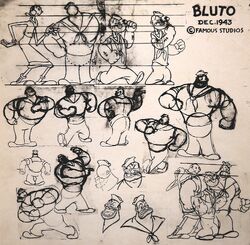
A year later Famous Studios opted for a more muscular image
The Fleischer cartoon Bluto was based on the character named Red Flack (played by Tyrone Power Sr.) in the 1930 epic western film The Big Trail . He was burly, mean, and strong as an ox--and only marginally more intelligent--and unquestionably a character to root against.
Following the takeover of the Popeye animated franchise by Paramount Studios in 1942, the Bluto character received a major revamp. Beginning with the cartoon The Anvil Chorus Girl (1944), his voice portrayal went from the gruff, terse, quasi-Germanic sneer to the hep, blue-collar, outer-borough slang perfected by Jackson Beck. A new dynamic was introduced: his now-handsome appearance made him a threat to Popeye by being attractive to women (Olive Oyl in particular). Bluto flexed his muscles and grinned devilishly in Anvil, and Olive was enthralled. Eventually the line of delineation between which character was the protagonist and who was the antagonist became blurred, as Popeye was often reduced to being a clueless chump who was readily outwitted by his slick, beguiling adversary. And, most extraordinarily for this period, Bluto's physique was reconfigured to that of a bodybuilding champion-- a marked contrast to the oddly-muscular Popeye.
In his book Stronger Than Spinach: The Secret Appeal of the Famous Studios Popeye Cartoons, Steve R. Bierly writes: "Famous Studios Bluto predicted with remarkable precision what chemically-enhanced
Bluto's more formidable look as exhibited in Out to Punch
bodybuilders would look like a half-century later. The Famous Studios creators seemed to thoroughly understand the potential for human muscular development....Bluto...had thick, broad shoulders and exaggerated deltoid muscles; a 2-1 waist-to-chest differential; a pyramid shape set off by well-developed latissimus dorsii and an expanded ribcage; huge arms with bursting biceps and defined triceps." With an opponent so powerful in appearance, Popeye's accomplishment of defeating him became all the more remarkable.
Bluto pioneered a look--that of a hyper-masculine, cigar-chomping muscleman--that became commonplace in ensuing decades but was nothing short of revolutionary in the decade of the 1940s.
The Bluto/Brutus Issue
After the theatrical
Popeye cartoon series went out of production in 1957, Bluto was replaced by Brutus as it was erroneously assumed that Paramount Pictures--distributors of the Fleischer Studios (later Famous Studios) cartoons--owned the rights to the name "Bluto." In fact, King Features had proprietary rights to the name all along, as Bluto had been initially created for the Segar comic strip. However, due to incomplete research this fact was overlooked, and the name "Brutus" was substituted in order to avoid potential copyright issues[1].
Brutus appeared in the 1960-1962 Popeye television cartoons, but Bluto returned in the Hanna-Barbera Popeye series of 1978 and the 1980 Popeye movie, as well as Hanna-Barbera's 1987 Popeye and Son series. Brutus was used by Nintendo for their arcade game based on the property.
Bluto and Brutus are less physically alike than they might appear, although there are some similarities that led to the reveal in the comics that they are in fact siblings. Bluto, at least in his Famous incarnation, is drawn with prominent chest and shoulders tapering to a chiseled midsection. Brutus, on the other hand, resembles the early comics Bluto with a paunchy waistline and a relatively undeveloped upper body. Bluto often has a handsome countenance, whereas Brutus is drawn with an almost goofy look. Bluto has the tattoo of a battleship on his chest (with interactive capabilities), while Brutus' similar tattoo is located on his upper arm. Bluto posesses an almost diabolical craftiness in his dealings with Popeye, while Brutus' interactions can be generally characterized as inept. Another subtle difference between the characters is that, while Bluto was portrayed as a fellow sailor who also sought to win the heart of Olive Oyl, Brutus is portrayed as a generic villain, malefactor, or finagler who showed little romantic interest in Olive. Instead, he would only take her hostage in a rough manner, opening the way for Popeye to rescue her.
Prior to the change to Brutus, the bearded villain was known as "The Big Guy that Hates Popeye," "Mean Man," and "Sonny Boy" in the comic strip and comic books. The name "Brutus" was first used on Popeye-related products in 1960 and in print in 1962. Although it may be argued that they are one and the same, Ocean Comics has published one of the Popeye Special comic books where Bluto and Brutus were twin brothers. Bobby London, who drew the "Popeye" daily strip for six years, wrote and illustrated "The Return of Bluto" story where the 1932 version of Bluto returns and discovers a number of fat, bearded bullies have taken his place, calling themselves "Brutus" (each one being a different version of Popeye's rival). On December 28, 2008 and April 5, 2009, the Popeye comic strip added Bluto in the capacity of twin brother of Brutus.
Voiced/portrayed by
Bluto was voiced by a number of actors, including William Pennell, Gus Wickie, Pinto Colvig, Tedd Pierce, Dave Barry and Jackson Beck. Beck also supplied the voice for Brutus in the early 1960s. In the 1980 live-action movie, he is portrayed by Paul L. Smith. In The All-New Popeye Hour and Popeye and Son, he is voiced by Allan Melvin, and in Popeye's Voyage by Garry Chalk.
Other characters
In the animated cartoons, Popeye's foe is almost always Bluto, functioning
in some capacity—fellow sailor,street tough, theater hypnotist, Arab sheik, competitive swimmer, etc. However, in the Famous era shorts, there have also been "original" one-time characters with Bluto-like personalities and mannerisms such as the blond, cleanshaven lifeguard in Beach Peach (Jackson Beck vocalized this character using the same voice, and some fans maintain that he was just Bluto with his hair bleached) or
The 'alternate' Blutos often had interchangeable characters
the boxing champion in Punch and Judo that reappears as the scofflaw in Cops Is Tops (he had a shaved head and altogether different voice).
Other Media
Bluto appeared in the Robot Chicken episode "The Sack," voiced by Dave Coulier. In a segment that parodies the Popeye cartoons in the style of the film It's a Wonderful Life, Popeye and Bluto have opened up a bank together in what the world would look like without Wimpy. The Bluto/Brutus name debate has also become a topic of interest on The Rick Emerson radio program.
Gallery
External links
- Popeye | The Home of Popeye the Sailor Man website
- Don Markstein's Toonopedia Popeye page
- Bluto at the Internet Movie Database


